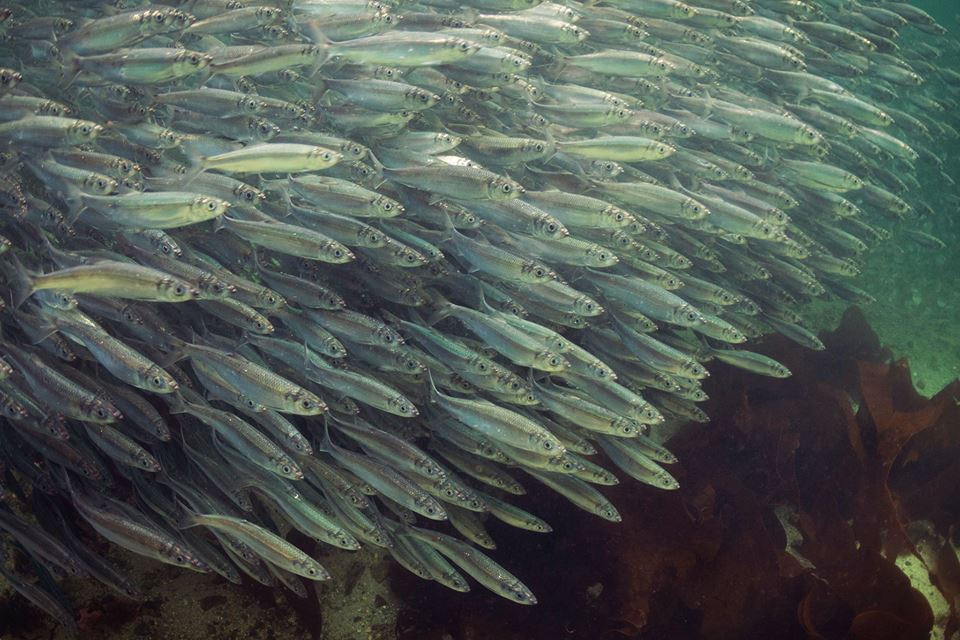Wildlife advocates are speaking out, with this year’s Salish Sea herring fishery on the horizon.
They say coastal British Columbia’s herring stocks are collapsing and the fishery is only making matters worse.
Advocacy groups including Conservancy Hornby Island are calling for a moratorium on the province’s last remaining herring fishery.
It claims that with less than 56,000 tonnes of herring, it’s the lowest numbers since the industrial collapse of the herring fishery in the 1950s, adding that the Department of permits a quota “unchanged since 1983.”
The group adds that Fisheries and Oceans Canada’s own scientists state that the risk of collapse is high, stocks are in decline, and reduction of quota is the best way to use precaution.
Conservancy Hornby Island’s Locky MacLean, says the commercial fishing boats are gathering, waiting for herring to surface.
“They’re around, they know it’s about to happen and it’s really up to the herring,” MacLean said.
“Some people think it’s a full moon. That’s March 9th. Others think it’s sunlight, so if herring sees a couple of days of sun, they rise to the surface.”
MacLean said the “tragic component” is it’s a reduction fishery, or one that reduces, or processes its catch into fishmeal and fish oil.
“The official reason (for the fishery) is the eggs are sent to Japan as the golden eggs that go on top of the little sushi rolls,” he said. “But there’s no money in that anymore. That used to fetch $5,000 a ton back in the 70s – I think the peak was around $5,800 a ton back then. You’re looking now at a fishery that’s $400, $500 a ton, something like that.”
He also pointed out that the herring carcasses, minus the egg sacs, are rendered into pellets for salmon farm food, as well as dog and livestock food.
Meanwhile, he says this fishery is taking wild chinook salmon’s primary source of food out of the ocean.
MacLean believes this is a “wasteful” fishery, adding that local ocean life is in desperate need of that bottom component of its food chain.
“That bottom part of the pyramid is what’s missing in the Salish Sea,” he said. “That’s why these symptoms are coming up, like bears going hungry, chinook salmon starving to death, orcas getting peanut head, they’re lacking fish as well. All that goes back to the herring. If you’ve got no herring in the Salish Sea, everything up the food chain from there goes hungry.”
MacLean said support is growing to call for a moratorium. Conservancy Hornby Island’s online petition has gathered over 135,000 signatures.
He’s accusing the government of letting the herring industry call the shots.
“It’s a makework project to keep the factories going in Steveston, to keep these guys working, and fair enough. People need jobs but the fact is, there won’t be any jobs when this fishery collapses. Why not let the stocks recover? Let them regain abundance, let them regenerate, there will be more work for everyone.”
There is a rally planned for this Sunday on the waters off of Deep Bay, Denman Island, and Hornby Island.
It will be what MacLean calls a “three-pronged flotilla and rally.”
“We have a really good turnout expected there as far as First Nations representation as well as a lot of Denman Islanders, they’ve been working hard making signs, making banners,” MacLean said.
“The Hornby Hall was full yesterday as well with Hornby Islanders getting ready. It should be a good turnout next Sunday.”
He added that the centre of the rally, Lambert Channel, is really symbolic on the northern Gulf Islands.
“It’s the last area of spawn for the Strait of Georgia herring – their last spawning ground. This is the location where we will be going out in small boats, we’ve got a few trawlers, coming, I know there are a few sailboats coming down from Comox, Campbell River, and then obviously local boats from Ford’s Cove as well, and Denman and Deep Bay. So it should be interesting.”
In early February, the Department of Fisheries and Oceans Canada said, in part, that it’s committed to “effectively managing the Pacific herring fisheries through evidence-based decisions, ensuring the health and sustainability of these stocks into the future.”
It added that the 2020 Pacific Herring Integrated Fisheries Management Plan (IFMP) has been approved following a 30-day consultation period with First Nations communities and organizations and with stakeholders such as commercial harvesters.






